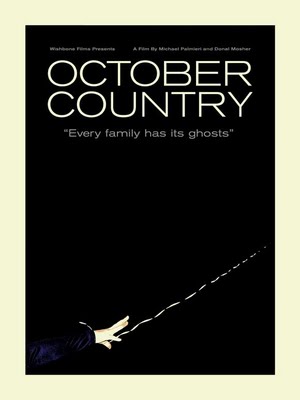Fri 12 Feb 2010
October in New York
Posted by Ethan under Film Review, NYC Film Critic
Comments Off on October in New York

October Country
Directed by Michael Palmieri and Donal Mosher
Featuring the Mosher Family
***
I’ve always had mixed feelings about a certain type of documentary that, for lack of a better genre label, I’ll call the “home movie doc.”
These are films where the documentarian turns the camera on his or her own life, interviewing friends, lovers and family members, revisiting important places and memories (through old photos or actual home movies) and ruminating about their past, present and futures in voiceover. Sometimes the results are fascinating to behold. Ross McElwee’s remarkable 1986 travelogue Sherman’s March is the gold standard when it comes to this brand of documentary and last year I enjoyed both The Beaches of Agnés, in which French New Wave icon Agnés Varda recounted her heady days spent with Godard and Demy, as well as William Kuntsler: Disturbing the Universe, a biography of the famed ’60s activist directed by his two daughters.
On the other hand, I found Jonathan Caouette’s 2003 mixed-media memoir Tarnation, which traced the director’s difficult childhood growing up with a schizophrenic mother, to be somewhat exploitative and I had similar issues with Kurt Kenne’s Dear Zachary from 2008, where the story of a horrific crime perpetrated against the filmmaker’s friend becomes a vehicle for him to, in part, salve his guilty conscience. And that’s really the crux of the problem with the home movie doc. When the filmmaker is a crucial part of the story that their telling, it’s far too easy to let their personal version of events become the reality that viewers take away.

The way Donal Mosher, professional photographer and one-half of the directing team behind the new home movie doc October Country, attempts to navigate around this problem is by not inserting himself into the picture at all. That’s by no means an easy task when you’re making a movie about your own father, mother, sister and nieces where you are one of the people behind the camera asking them to share some of their most private thoughts and feelings with the paying public. In fact, Mosher’s approach raises a host of other ethical questions, like, isn’t he just taking advantage of his family to launch his career as a filmmaker? (It’s worth noting that much of his photography work involves his family as well.) What kind of role did he play in some of the major events from his family’s troubled past that are discussed in the film? And finally, how can we be absolutely certain that he hasn’t edited the film to portray the Moshers in a more positive light?
Actually, the last question is somewhat easy to answer because the family on display in October Country is definitely not depicted as a paragon of virtue. For starters, there’s Mosher’s father Don, ex-military man who served multiple tours of duty in Vietnam, Desert Storm and Desert Shield, a three-decade career that has left him with a serious case of post-traumatic stress disorder. While Don was off at war, his wife Dottie raised their daughter Donna and son Donal in their small home in the Mohawk Valley region of upstate New York. As a teenager, Donna fell in love with an abusive boyfriend and got pregnant, giving birth to Daneal, who eventually followed in her mother’s footsteps by having a baby while in high school. Other “characters” in the film include Desi, Donna’s 11-year-old daughter from another relationship; Denise, Don’s Wicca-practicing sister who is no longer on speaking terms with her brother; and Chris, the latest in a string of foster children that Don and Dottie have welcomed into their home.

In addition to the Moshers, the entire Mohawk Valley can be considered one of the stars of October Country. As photographed by Mosher and his co-helmer Michael Palmieri (a music video and commercial director making his feature debut) the region is marked by rolling mountains and lush forests. But the filmmakers intend for that physical beauty to stand in marked contrast to the region’s societal problems, which include high rates of unemployment, domestic abuse and teen pregnancy. As the only member of his family to leave the area, it’s clear that one of the reasons that Mosher made this movie was to try to understand why his relatives continue to live there and how that environment has shaped the course of their lives. One can’t help but wonder, for example, whether Daneal would have repeated her mother’s mistakes had Donna moved them both to another town or followed Donal to New York City. But, of course, had they left, Desi would never have been born. It’s probably for the best that Mosher doesn’t force his family to answer these kinds of “What if?” questions. He obviously admires their resolution to live their lives as best they can with the cards they’ve been dealt, even if he can’t entirely understand the choices that put them there.
Ultimately, it’s the Mosher clan’s resilience and lack of self-pity that keeps October Country from coming across as a case of pure exploitation. We can only speculate how the process of making this film must have affected their relationships with each other and with Donal, but it’s hard not to hope that they’ve emerged stronger from the experience, both as individuals and as a family. After all, for giving so much of themselves here, they deserve to get something positive in return.
October Country opens at New York’s IFC Center today for a one-week run. Visit the movie’s website, octobercountryfilm.com to learn more.

No Responses to “ October in New York ”
Sorry, comments for this entry are closed at this time.